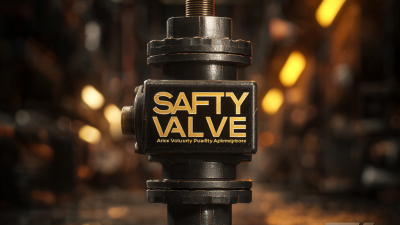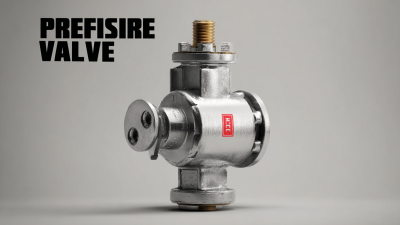-
Solutions
-
Waterworks
Pressure Reducing
Pressure Sustaining / Pressure Relief
Flow Control valves
Float Valves - Level Control
Electrically Actuated Valves
Pressure Modulation - Remote Control
Altitude Valves - Level Control
Burst Control Valves
Pump Control
CLA-VAL "HYTROL" Main Valve
Valve Controllers and Data Loggers
Air Valves
See allWaterworks
-
Military Fuelling
-
- About us
-
Blog
- Support
-
Contact
Blog
7 Key Reasons Why Flow Control Valves Are Essential for Efficient Industrial Operations
In the realm of industrial operations, efficiency is paramount, and one of the unsung heroes that play a crucial role in ensuring this efficiency is the Flow Control Valve. These valves are essential components in various systems, regulating the flow of fluids to optimize performance and maintain desired operational parameters. As industries strive for improved productivity and reduced waste, understanding the significance of Flow Control Valves becomes increasingly vital. In this blog, we will explore the seven key reasons why these valves are indispensable for industrial operations. From enhancing system reliability to minimizing energy consumption, the strategic implementation of Flow Control Valves can lead to substantial benefits, creating an imperative for companies to prioritize their effective use.

Join us as we delve into the top strategies for leveraging Flow Control Valves to achieve operational excellence.
Understanding Flow Control Valves: The Backbone of Industrial Automation
Flow control valves play a pivotal role in the realm of industrial automation, acting as the silent sentinels that regulate fluid dynamics within various systems. These valves manage the flow and pressure of liquids and gases, ensuring that processes operate smoothly and efficiently. By precisely controlling flow rates, they enhance system responsiveness and stability, directly impacting productivity and operational costs.

Moreover, the integration of flow control valves into industrial setups enhances safety and reliability. In systems where pressure fluctuations can lead to catastrophic failures, these valves adjust accordingly, preventing damage to equipment and ensuring safe operations. As industries increasingly adopt automation technologies, understanding and implementing effective flow control valve solutions becomes indispensable for achieving optimal performance and maintaining energy efficiency. In essence, these valves are not just components; they are the backbone of modern industrial processes, facilitating seamless automation and operational excellence.
Impact of Flow Control Valves on System Efficiency and Performance
Flow control valves play a critical role in enhancing the efficiency and performance of industrial systems. According to a report by the International Society of Automation, improper flow regulation can lead to energy losses as high as 20-30% in various applications. By ensuring optimal flow rates, these valves prevent pressure drops and maintain system balance, which is essential for energy conservation and process efficiency. In sectors such as petrochemical and water treatment, the integration of advanced flow control technology has shown to improve operational efficiency by up to 15%, translating into significant cost savings.
Furthermore, flow control valves are integral to maintaining desired process conditions, directly impacting product quality and operational reliability. A study conducted by the American Institute of Chemical Engineers found that systems utilizing automated flow control valves experience up to a 25% increase in overall system performance metrics. This enhancement is particularly crucial in processes where temperature and pressure stability are paramount, as fluctuations can lead to product defects and increased downtime. In a world where every percentage point of efficiency counts, the strategic implementation of flow control valves offers a pathway to superior industrial performance.
Impact of Flow Control Valves on System Efficiency and Performance
Key Types of Flow Control Valves and Their Applications in Industry
Flow control valves play a pivotal role in various industrial applications, ensuring the efficient regulation of fluid flow. Among the key types of flow control valves, the needle valve stands out due to its precision in managing small flow rates. This type of valve is commonly utilized in applications requiring fine adjustments, such as laboratory processes and analytical instruments. On the other hand, globe valves are ideal for applications needing throttling capability. Their design allows for smooth flow regulation, making them suitable for regulating fluid flow in heating and cooling systems.
Another essential category is the ball valve, known for its rapid on/off control and minimal flow resistance. This makes it particularly valuable in pipelines transporting liquids or gases where quick shut-off is necessary. Additionally, proportional control valves offer variable control over the flow rate, making them perfect for dynamic processes in manufacturing. With the right flow control valve in place, industries can optimize their operations, enhance safety, and significantly improve system efficiency. Understanding the unique applications and functionalities of these valves is crucial for maximizing their benefits in industrial settings.

Maintenance Best Practices for Optimizing Flow Control Valve Lifespan
Flow control valves play a critical role in maintaining optimal performance in industrial operations. To maximize their lifespan and efficiency, adhering to proper maintenance best practices is crucial. According to a report by the Flow Control Institute, improper maintenance can lead to a decrease in valve performance by as much as 40%, substantially affecting overall system efficiency. Regular inspections, along with timely replacements of worn parts, ensure that these valves operate within their designed parameters, minimizing the risk of failures that can disrupt production processes.
Implementing a proactive maintenance schedule increases the longevity of flow control valves significantly. Data suggests that facilities practicing scheduled maintenance can prolong valve life by up to 30% compared to those relying on reactive strategies. Techniques such as regular lubrication, thorough cleaning, and monitoring for wear can prevent costly downtimes. Additionally, utilizing condition monitoring technology can provide real-time insights into valve performance, allowing operators to address potential issues before they escalate. Thus, adopting these best practices not only optimizes the lifespan of flow control valves but also enhances the overall reliability of industrial operations.
7 Key Reasons Why Flow Control Valves Are Essential for Efficient Industrial Operations - Maintenance Best Practices for Optimizing Flow Control Valve Lifespan
| Reason | Description | Impact on Efficiency | Maintenance Best Practice |
|---|---|---|---|
| Flow Regulation | Ensures consistent flow rates in operations. | Prevents bottlenecks, enhancing production rates. | Regular calibration and testing. |
| Pressure Control | Maintains desired pressure levels within systems. | Improves safety and operational stability. | Routine inspections for leaks and malfunctions. |
| Temperature Management | Controls fluid temperatures to prevent overheating. | Extends equipment life and reduces failures. | Monitor temperature sensors regularly. |
| Fluid Compatibility | Selects suitable materials for the specific fluids. | Reduces corrosion and material wear. | Cross-reference materials with fluid properties. |
| Automated Control | Facilitates remote monitoring and control. | Enhances operational flexibility and responsiveness. | Implement up-to-date control system software. |
| Energy Efficiency | Minimizes energy consumption in operations. | Reduces operational costs significantly. | Regularly audit energy usage and performance. |
| Safety Mechanisms | Provides fail-safes against system failures. | Enhances workplace safety and compliance. | Conduct safety drills and maintenance checks. |
Future Trends in Flow Control Valve Technology and Their Industrial Implications
As industries continue to evolve, the technology behind flow control valves is experiencing significant advancements. These innovations are geared towards enhancing efficiency, reliability, and automation in various industrial processes. One key trend is the integration of smart technologies into flow control systems. Sensors and IoT capabilities allow for real-time monitoring and data analysis, empowering industries to make informed decisions that optimize fluid management.
Tip: Consider investing in flow control valves with built-in sensors to facilitate predictive maintenance, which can prevent unexpected downtime and reduce operational costs.
Another pivotal trend is the emphasis on energy efficiency and sustainability. Modern flow control valves are designed to minimize energy consumption and reduce waste, aligning with global sustainability goals. Manufacturers are increasingly focusing on using eco-friendly materials and processes, making the production and operation of flow control valves more environmentally friendly.
Tip: Look for valves that are rated for energy efficiency, as these can significantly lower operational costs while promoting greener practices within your facility. Adopting such technologies not only enhances performance but also positions your operation as a leader in sustainable practices within your industry.
Related Posts
-

How to Choose the Best Flow Control Valve for Your Industrial Needs
-

Innovative Solutions for Optimal Performance with Best Flow Control Valves
-

Understanding the Importance of Best Safety Valve Standards in Industrial Applications
-

7 Compelling Reasons Why Float Valves Are Essential for Efficient Water Management
-

Common Challenges Faced When Selecting the Best Pressure Relief Valve Solutions
-

Finding Quality Suppliers for Best Pressure Control Solutions and Effective Sourcing Strategies
CLA-VAL UK Limited
Dainton House
Goods Station Road
Tunbridge Wells
Kent, TN1 2DR
© 2025 CLA-VAL UK | site map | Terms and Conditions of Sale and Warranty | Privacy policy

